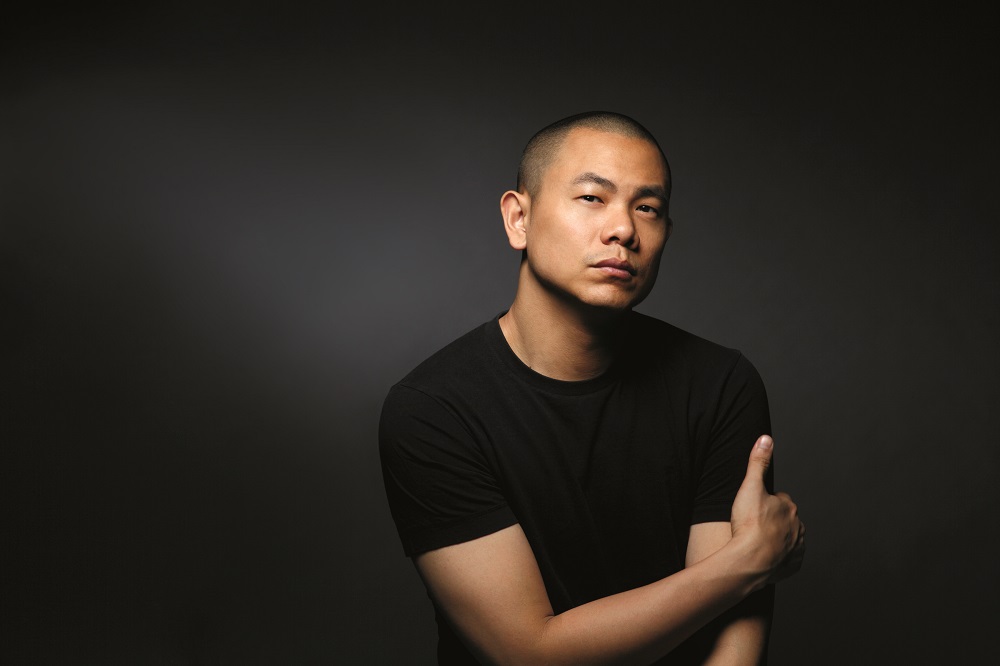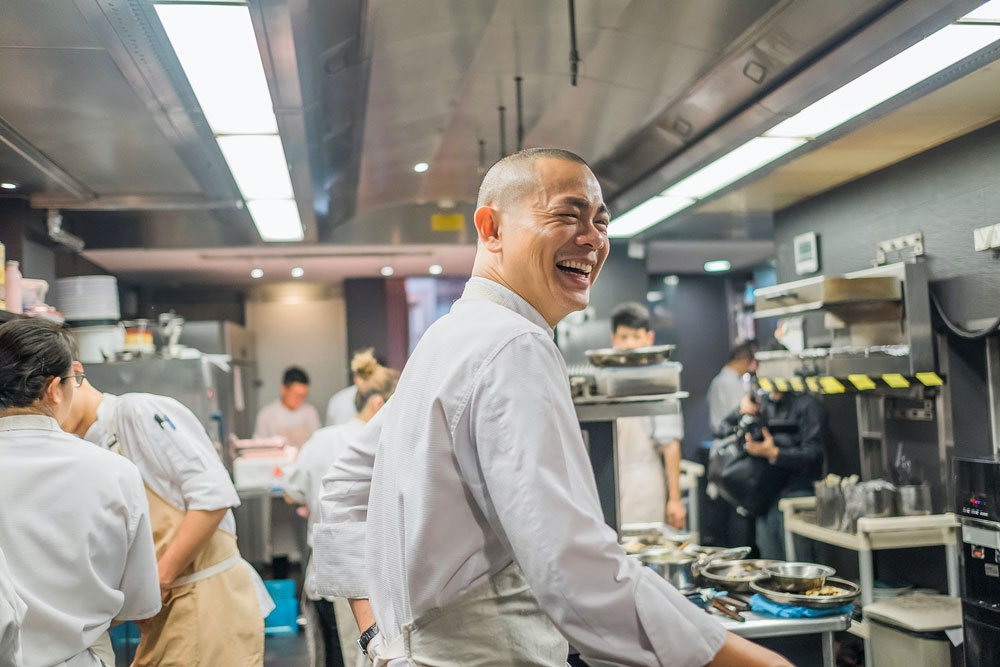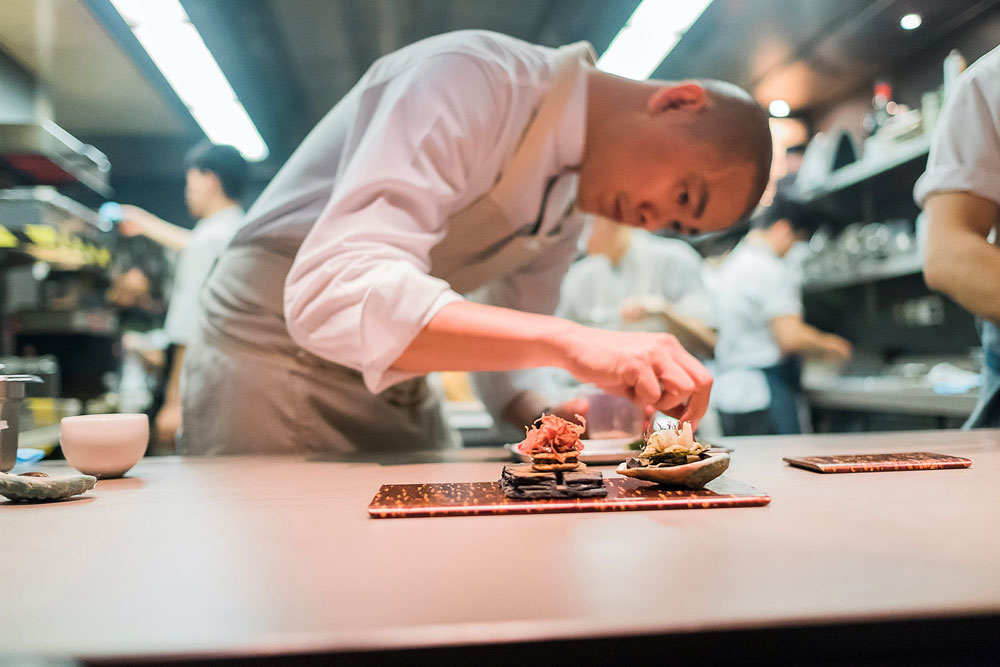Not one to be afraid of change, culinary prodigy turned perfectionist chef André Chiang’s definition of success lies not in the number of stars and accolades he earns. Rather, for him, the measure of success lies in how his legacy of Sichuan cuisine is carried forward

André Chiang. A name that needs no introduction anywhere in the world. Born in Taiwan, 44-year-old Chiang first fell in love with cooking as a result of his mother’s influence and started his career when he moved to the south of France at the young age of 15. 15 years later, he returned to Asia as a mighty culinary force and visionary to be reckoned with, a man who refused to be defined even by his own success.
Chiang honed his culinary skills with work experience amassed under the greatest masters of French Nouvelle cuisine such as Alain Ducasse, Pierre Gagnaire, the late Joël Robuchon, Michel Troisgros, Pascal Barbot, and Jacques & Laurent Pourcel. Despite starting at the lowest rung, Chiang quickly rose up the kitchen ranks, proof of his skill and tenacity. Case in point, Chiang was invited to apprentice as a commis at Pourcel’s three-Michelinstarred restaurant Le Jardin des Sens in Montpellier, France just three years later when he turned 18 years old. It was there that he created ‘Memory’ – a whipped foie custard topped with a coulis of wild mushrooms and Perigord black truffles – which eventually became a mainstay on all his degustation menus at Restaurant André, while other elements of his menus changed on a seasonal basis.
Chiang’s restaurants constantly graced Asia’s 50 Best Restaurants list, with his eponymous two- Michelin-starred Restaurant André at #2, Burnt Ends Singapore at #10, and RAW Taipei at #24 and Best Restaurant in Taiwan, in 2017. And with good reason too. For instance, when he opened Raw in Taipei in 2014, Chiang sparked a new wave of mod contemporary dining in Taiwan as he designed seasonal degustation menus that heroed local ingredients inspired by Taiwanese classics but presented through modern creations. Who else could recreate street food snacks such as tea-braised eggs into molten-centered quail eggs cooked in an earl grey-bay leaf concoction. Mad? Perhaps. Successful? Without a doubt. Unsurprisingly, Chiang’s determined approach to RAW also saw the restaurant earn two Michelin stars.
But in a shocking move, Chiang shuttered his 30-seater Restaurant André for good in 2018 shortly after he announced to Singapore (and the world) that he was returning his Michelin stars and was returning home to Taiwan after 30 years.
Singaporean filmmaker Josiah Ng’s recently released documentary titled André and His Olive Tree shed light on aspects of Chiang’s rarely seen personality and attempt to answer “Who is André?” as he “designs his own personal framework, almost DNA-like, based on true self-knowledge and to encourage his own creativity”. Even now as he trains other Chinese chefs to keep the Chinese culture flag flying high on the international stage, Ng discovered that Chiang wasn’t concerned about the legacy he’s leaving behind. Instead, he says, “What I do care about is ‘how to carry on the legacy of Chinese cuisine?’ If there’s one thing I would love to leave behind, is to set a world-class standard of Chinese cuisine (Sichuan cuisine) for everyone to really appreciate the beauty of our culture.”
We caught up with Chiang to find out more about his quest for perfection and what his next conquest would be, as he is one to never rest on his laurels. For this natural born leader, leading the charge is second nature to him, as is creating waves of change.
How would you describe your evolution as a chef and as a creator?
A chef manages the kitchen, cuisine and produce, creating a memorable dining experience; however a creator manages the entire experience, from branding, strategy, CRM, to dining and design, including leading a trend or a topic which will eventually influence people’s behaviour and thoughts.
Tell us more about octaphilosophy
Octaphilosophy is my principle of cooking; it stays and follows me wherever I go. In a nutshell, it’s my culinary principle, the backbone of my creative process at Restaurant ANDRÉ and a dining experience centered on an eight-pronged philosophy that describes my culinary ethos and the elements that shaped my past and dreams. Each dish on my degustation menus showcase a different interpretation of my philosophy’s eight elements: memory, artisan, pure, salt, south, terroir, texture and unique. Josiah Ng’s André and His Olive Tree documentary addressed Chiang’s obsession with results and perfection in a country like Singapore, and exploring the Asian culture’s definition of success.
How do you define success and what is the significance of the olive tree to you?
Success means that you have the ability to make many more people succeed or to help many more people around you pursue their dreams. To me, the olive tree represents my “original intention” of one part of me in France, one in Singapore, and one in Taiwan. It’s about “what I want to be”, “who I am”, and “where I belong”.
What were your reasons for returning the coveted stars and would you do it all again?
Will you try to be in a beauty pageant competition just to prove you are beautiful? There are things in life that we chase, and could live without. I will definitely do it again, anytime.

Why are creativity and reinvention important to a chef?
The importance is the same reason as why we need different artistic eras such as the Victorian age; Art Deco style; the 80s; the 90s; and the Contemporary period to define different styles. I define mine as Modernism, which represents living in the present and appreciating the precious moments of where we are right now, giving a definition of the present to each generation and history. To reinvent is to continually create; it is like re-writing the history of food to reveal new truths.
How do you want to be best remembered?
I would like to be remembered as “The Chef that created a new era of Chinese cuisine and French cuisine in Asia”. It is our mission to create a new era of things; we should all have that mentality and take pride in it. I want to be remembered as the chef that sets a world-class standard and example for all Asian chefs; the first person making Asia proud by using European interpretation and technique to redefine Chinese cuisine.
There are perfectionists... and then there is you. How would you describe perfection?
I like to describe perfection as a painting. Before you start painting, you already have a vision of what you want to paint; how you want to paint it; or sometimes, why you want to paint. So, who sets the standards of perfection? Who should define what “perfect” is? For me, perfection is the original purpose and intention of why I’m doing what I do, and eventually I achieve my own expectation of purpose.
Looking back at your ‘simple man’ beginnings, how has your personal story evolved and what would you change?
We all got lost somewhere, somehow along our journey, chasing some unnecessary goals that we thought were the real purpose of our life. Some return to their original intention, but some don’t. I’m still that “simple man”, and I’m glad Restaurant André reminded me to stay true to myself. I wouldn’t want to change anything.
How important is sustainability and how do you apply it?
Sustainability is a necessary and basic practice to our generation – sustainable practices in local produce, local team, local lientele and local inspiration. I apply the same principle to all my nine restaurants around the globe.
You are an incredible visionary. What’s next on your horizon?
Being the “Ambassador” of Asia’s cuisine. I want to analyse, redefine and globalise Asian cuisine in front of the world, and help each culture and cuisine find its own uniqueness and language.
